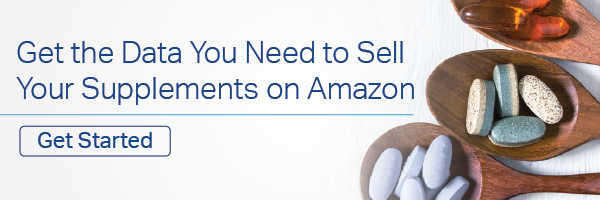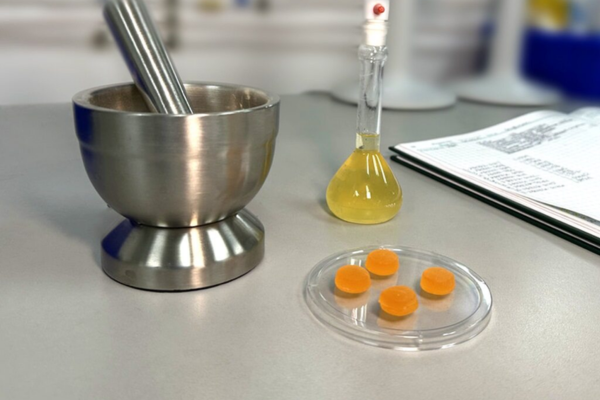Are you selling supplements on Amazon? Then you need to be aware of Amazon dietary supplement requirements for testing.
Manufacturers and Own Label Distributors (OLD) face strict Amazon dietary supplement requirements, much like those required by the U.S. FDA.
Here’s what you need to know to make sure your products are in compliance with the Amazon Dietary Supplement Policy.
Find out more about Amazon’s 2026 supplement policy updates here.

What a Dietary Supplement Is…and Isn’t
There are many FDA requirements pertaining to the lawful sale of dietary supplements, including what ingredients they may contain.
Amazon has adopted many of these requirements as conditions of selling supplements on Amazon, with the aim of enhancing consumer safety by protecting people from adulterated products such as unapproved new drugs or dangerous and potentially harmful substances.
Per FDA’s Dietary Supplement Health and Education Act (DSHEA), a law passed by Congress in 1994, products using the term dietary supplement may include dietary ingredients like…
- Vitamins
- Minerals
- Herbs and other botanicals
- Amino acids
- Other dietary substances for use to supplement the diet by increasing the total dietary intake.
- A concentrate, metabolite, constituent, extract, or combination of the preceding substances intended for human consumption.
Amazon Dietary Supplement Policy – Product Categories
Amazon’s 2024 policy update introduced a shift in how dietary supplement sellers must manage their product listings. Amazon prioritized three supplement categories for these requirements:
- Sexual Enhancement
- Weight Management
- Bodybuilding & Sports Nutrition
Amazon Supplement Requirements – Regulations and Lab Testing
If you list products on Amazon, you must comply with all applicable laws, regulations, standards, and Amazon dietary supplement policies related to those products and product listings.
- Dietary supplements have their own current Good Manufacturing Practices regulations (cGMPs) found in the U.S. Code of Federal Regulations 21 CFR 111 and specific labeling requirements found in 21 CFR 101.36 and an FDA Dietary Supplement Labeling Guide.
- 21 CFR 111 requires establishing specifications for identity, purity, strength, and composition, which must be verified via lab testing.
- You must also identify and quantify any contaminants that would render a product adulterated.
- As dietary supplements are a subcategory of foods, manufacturers and Own Label Distributors must also comply with the Food Safety Modernization Act requirements found in 21 CFR 117, including conducting risk analyses to identify any known or foreseeable hazards that could make the product injurious to consumers.
Dietary supplements must not make disease claims or contain undeclared drug ingredients or articles that are approved as new drugs.
You must verify that dietary supplement products meet the Amazon Dietary Supplement Policy via third-party testing on an annual basis to ensure products offered on Amazon meet the following criteria:
- Products are manufactured in a facility compliant with the FDA’s Current Good Manufacturing Practice regulations (cGMPs, 21 CFR 111/117 or equivalent).
- Products do not contain contaminants that may pose a human health or regulatory concern.
- Products contain the ingredients claimed on the product label.
- Products do not contain undeclared active pharmaceutical ingredients.
- Products are labeled according to guidelines set forth by the FDA and do not contain illegal or disease claims.
| Parameter | Requirement |
|---|---|
| Product was manufactured in a facility compliant with cGMPs in accordance with requirements outlined in 21 CFR 111/117 or equivalent. | Accepted GMP programs include but are not limited to the following: Eurofins GMP, NSF/ANSI 455-2, 229 GMP, UL GMP, USP GMP, SAI Global, SGS, Intertek, TGA, SQF Dietary Supplements Food Safety Code, GFSI, and SSCI. GMP must be performed by an accredited third-party. Private audits, first-party audits, consulting audits, FDA inspections, and ISO standards will not be accepted. The GMP certificate must be in good standing and cannot be expired. |
| Contaminant screen* | Products must be tested for the presence of heavy metal and microbial contaminants, and based on a review of the finished product components may also be tested for pesticides and THC in accordance with requirements outlined in NSF/ANSI 173-2024 or according to USP <2021>, <2022>, <62>, <561>. |
| Content claims verification* | Products must contain dietary ingredients according to tolerances listed in 21 CFR 101.36 and 101.9(g)(3) & (g)(4). |
| Active pharmaceutical ingredient screen* | Products classified as sexual enhancement, weight management, or sports nutrition and body building must undergo testing for known adulterants outlined in NSF/ANSI 173-2024 5.3.5.1- 4. |
| Product labeling and claims | Products must clearly show facts panel, ingredient list, identity statement, appropriate FDA disclaimers, and relevant product warnings. Products must not contain illegal or disease claims that are not authorized by the FDA. |
*For products where testing has already been conducted by an ISO 17025-accredited lab (including in-house labs), you can submit a test request form for the affected products to an approved verification service provider of your choice. You can provide this information directly to the third-party verification provider if it meets Amazon’s Dietary Supplement Policy.
Amazon Dietary Supplement Requirements – Using a TIC Verifier
One of the most important changes to Amazon’s Dietary Supplement Policy, effective April 8, 2024, is the need to submit your Certificates of Analyses (COA) to an Amazon-approved testing, inspection, and certification (TIC) verifier to verify that products meet Amazon’s policy.
This means that you can conduct your supplements lab testing at any lab, including Certified Laboratories, that meets Amazon’s requirements (for example, to be ISO 17025-accredited), but you must submit the COA to the TIC of your choice for verification. Amazon includes a list of approved TICs on its website.
Since TICs are subject to change, go to the “Manage Your Compliance” dashboard for the current list. Once there, follow these steps to submit your COA:
- Click Add or appeal compliance next to the product.
- Select Request lab service.
Prohibited Ingredients and Other Prohibitions for Dietary Supplements Sold on Amazon
Amazon maintains dietary supplement policies that include certain prohibitions, including the following (view the complete list here):
- Supplements must not be named in an FDA recall or safety alert.
- Supplements must not contain ingredients prohibited by the FDA (such as contaminants or pharmaceutical drugs).
- Supplements must not be adulterated, such as being unsafe or lacking evidence of safety, or misbranded like having false or misleading information on the label in an FDA warning letter.
- Examples of prohibited ingredients include pure powdered caffeine, and anything listed in Schedules I, II, III, IV, or V of the U.S. Drug Enforcement Agency’s (DEA) Controlled Substances Act. This includes Cannabidiol or CBD.
- Also prohibited for sale on Amazon are chemicals and their derivatives contained in the DEA’s Diversion Control Division List 1.
- Supplements that contain ingredients derived from animals that are prohibited under the Endangered Species Act, the Migratory Bird Act of 1918, the Wild Bird Conservation Act, the Bald and Golden Eagle Protection Act, the Marine Mammal Protection Act, the Lacey Act, or the Convention on International Trade in Endangered Species, including, but not limited to, sharks, whales, dolphins, or porpoises, are prohibited from sale.
- Supplements that contain more than 12% hydrogen peroxide are prohibited from sale.
- Patches that are marketed as dietary supplements or detox products are prohibited from sale.

Use of ISO 17025-accredited laboratories is one Amazon dietary supplement requirement.
Amazon Dietary Supplement Requirements – Packaging & Labeling
Amazon maintains strict policies regarding supplement product packaging and labels. For starters, you must follow regulations for supplement product labeling given in 21 CFR 101.36 and 21 CFR 101.9(g)(3-4). In addition…
- Supplements must be sealed in the original manufacturer’s packaging; must be new and unused; and must clearly display the identifying codes placed on the packaging by the manufacturer or distributor, such as matrix codes, lot numbers, or serial numbers.
Supplements must be labeled in English with the following information:
- The name of the dietary supplement.
- The total quantity or amount of the dietary supplement, such as 100 tablets, 5 mg, 6 oz.
- A “Supplement Facts” panel.
- Ingredient list.
- Name and address of the manufacturer, packer, or distributor.
Additional label restrictions include…
- Supplement labels must not contain disease claims or implied disease claims, unless the statement has been approved by the FDA. Disease claims include claims to diagnose, state that the products cure, mitigate, treat, or prevent a disease in humans.
- Supplement labels must not claim that the products have the same effects as controlled substances or prescription drugs, such as names that could be confused with controlled substances or prescriptions drugs, like “Viagrex” or “TestosterX”).
- Supplement labels must not claim that the supplements are “FDA approved”.
- Supplement labels must not use the FDA logo.
- Supplement labels must not state “tester,” “not for retail sale,” or “not intended for resale”
What Do Amazon Dietary Supplement Requirements Mean to Me?
If you are a dietary supplement manufacturer or Own Label Distributor (OLD), compliance with Amazon’s dietary supplement requirements is a must. Their requirements go a long way to meeting those of FDA, ensuring that your products meet specifications requirements and are free of or have only safe amounts of any contaminants.
Certified Laboratories can help you meet Amazon supplement requirements. With our high throughput and state-of-the-art LC-MS/MS technology, we can provide accurate results quickly, helping you meet requirements to sell on Amazon.
Contact us to get a quote for your Amazon dietary supplement laboratory testing.
